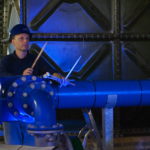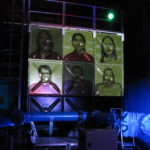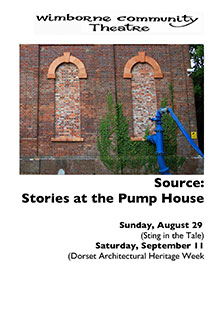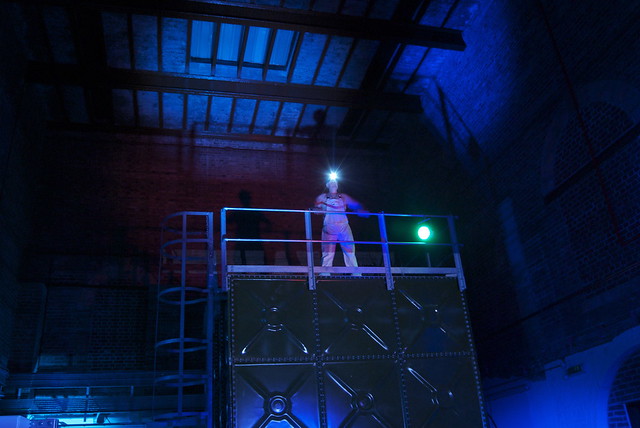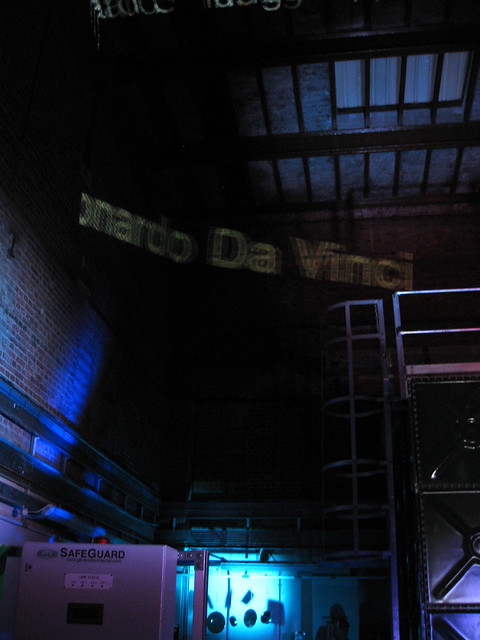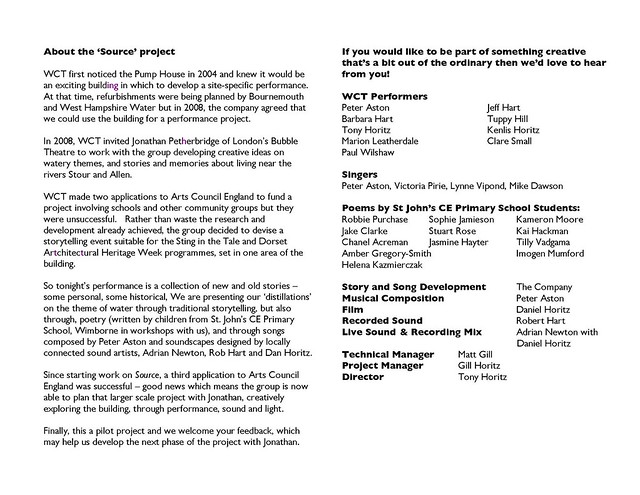For many years peacocks have lived in Wimborne, near Deans Court and around the building of the old Queen Elizabeth School. Perhaps you have seen them wandering there or heard their strange cries. No one seems to know how they came there although some people say they were brought from India by adventurers in the 18th and 19th centuries.
In every part of the world, for as long as people can remember, peacocks are thought of as symbols, representing many things, but especially immortality, long life and love. Mostly they’re shy and retiring but also watchful and concerned. They sense when rain is due, and become restless and move in a strange spiraling dance,
Once, over a hundred years ago, at the time of the spring solstice people noticed how the peacocks gathered in the evening by the river at Eye Bridge. Their strange high calls came floating over the water meadows – and another sound, of laughter and voices, light and joyful, almost like the sounds of a stream flowing over rocks or eddying around reeds.
Edith and William were about fifteen, and lived at Pamphill, close to the river. They knew every inch of the fields and the river bank. When they heard these strange sounds they hurried down to the river to investigate.
They hid behind a ridge of black thorn. Six or more peacocks gathered in a clan, and some of the birds strutted and muttered while others were quiet. And then began a kind of song from the birds, low at first then rising up to the high call the females use when mating, but softly. And over and above those sounds came the human voices, young as well as older, and altogether Edith and William thought it sounded like a party.
And yet they saw no one except the peacocks beginning to swirl in a strange shivering dance. And then a wind blew up, and the high reeds began to wave and twist in the evening light. Edith and William felt cool air brush against their cheeks, almost they said as though someone was breathing on them. And then the rain began, a few large drops at first breaking up the surface of the river, and then faster, heavier, drowning out the voices and laughter, until all they could hear was the rain steadily pouring around them. By then they felt cold, and the light had fallen fast, and the peacocks were beginning to move back towards the town.
Edith and William told their story in the way stories are told, over and over, to school friends, teachers, cousins, people they met over the years, and it began to take on a life of its own, until one day in the early years of the twenty-first century, a group of Wimborne residents sat down to talk about the rivers running through their town, and think about what that might mean for the people living there.
And they thought about the strange ways of peacocks and the symbolism attached to them over the centuries, and they imagined those peacocks on that spring evening were carrying out a healing ritual, a way of calling the souls of people who’d drowned in the town’s rivers over the years, calling them back to the river bank to be part of the breeze blowing across the town, which you will feel on a spring evening at Pamphill.
This is the story of a life transformed by a water pump.
Once there was a woman called Lucy. She lived in Kandiga, in Ghana. She still lives there but today her life is quite different from the way it was more than ten years ago.
It was the women’s job to fetch water. It had always been so. There was no choice. Unless a woman fetched the water for her family, her family would have none.
In those days, the women in the village set off at dawn. The need for water determined everything, their thoughts, their plans, their daily lives, even their dreams.
As early as three in the morning, when the day was just emerging, between dark and light, the women set out to walk the three miles to the river.
As they walked the women thought about the soft beds they’d left, and their sleeping children who would soon wake. And they thought about the weight of the empty water pots and the weight of the full ones, and they thought about the sound of water being drawn out of the well, and the sound of it pouring into the cooking pot, or being splashed by the children washing. And they thought about those quiet moments they longed for when they would bend over their own washing bowl and splash the water over their arms and backs.
Sometimes they hummed or sung quietly as they walked the long path to the river. That helped them to feel stronger, less intimidated by the sudden movements or sounds. They hoped their voices would frighten away the snakes which loved the dry scuttling paths and the thick clumps of grass. Sometimes a woman might slip or stumble on the uneven road, or someone’s ankle would twist climbing over the steep river bank. Often, water pots would fall and break.
There was another fear which the women hoped their songs would frighten away. The bad strangers that sometimes assaulted a women when she went into the bush to go to the toilet. That was the worst fear. To sing was to make them feel braver.
In the long dry season from November to March there were other problems. Water in the river became scarce and quarrels broke out, and people fought for the water. There were quarrels in the family, beatings and divorce. Children became malnourished. And in the rainy season came diseases: diarrhea, dysentery, guinea worm, cholera.
Fetching water took a long time. Sometimes Lucy’s children waited and waited for her to come back, but for one reason or another she was held up and they went to school late, without washing and eating breakfast.
And then Lucy would be late for her job. She was a teacher at the local school, the only woman teacher. How she worried! There was so much at stake. Being a teacher was a great joy and source of pride. In rural communities only one woman in every thirty men was educated. Because women had to fetch water every day, most gave up any idea of having a job outside the home. They dedicated themselves to their role of water carrier.
But for Lucy it didn’t seem right. She thought hard, and felt sorry for herself and all the women and families in her village. She became depressed and wearied by the constant struggle. She began to think, ‘Am I not capable of achieving anything in life but the fetching of water? To carry a water pot for three miles without spilling a drop – will that be my life’s achievement?’
One day as she waited her turn at the river, someone told her about hand pumps and how an organsiation called Water Aid might help her buy some for the village. Imagine what it would do to our lives, she thought. And knew at once she would find a way to get one.
Over the next months she contacted Water Aid, and one thing led to another until a time when the local people were shown how to dig two wells. Water Aid helped them raise money to buy the pumps, and provided skilled labour to line the wells.
On the first day after the hand pumps were installed Lucy woke up suddenly at 6 am and cried out ‘Oh, I’m too late to fetch water from the river.’
Then she heard her excited children outside – they’d woken early and filled the water pots with clean water and were already preparing breakfast.
How simple. A pump. A tap. A toilet. And so life became more peaceful. Now everyone fetches water. And more children go to school. And the school is fully staffed because teachers like jobs near water pumps.
And the women have time to look after their families and earn money by weaving or farming. They’re seen as equals and take part in decision-making. They’ve become community leaders. And the local community manages its resources. So living conditions are improved and health.
Lucy says all their lives have been transformed. She listens to the sound of the tap water pouring into the pot and sings with joy.
Masked figure/s in white coats are revealed at the top of the green tank. They bring 4 metal water jugs. They pour them into another vessel below.
This is the story of the Great God Tlaloc. This name – Tlaloc – comes from a word that means ‘earth’ and “the path beneath the earth”, it means “long cave” or “he who is made of earth”.
To the Aztecs of Mexico, Tlaloc was a god of rain and fertility and water. He appeared to them as a man with circles around his eyes and fangs like the teeth of a jaguar. People imagined that he had the power of lightning and thunder and the power to control the abundance of plants and trees and all green things.
Nothing was straightforward with Tlaloc. He gave sustenance to the world, but was also feared for the harm he could do. Sometimes he was thought of as a cloud over a mountain. He owned four great water jugs: one poured forth glorious life-giving rain, while the others produced disease, frosts and drought onto the world.
Tlaloc had a wife, *Chalchiuhtlicue. Together they supervised the spirits of Tlaloque, who was in charge of the weather and the mountains. When it was time to deliver rain to the earth, the spirits of Tlaloque poured it on the earth at the right time in the right place, and when it was necessary to make thunder they clashed their water jugs together.
It was the custom in those days that in order to worship and appease the Aztec gods, people offered them human sacrifices. During the dry season the priests sacrificed children to Tlaloc, and although they were sad they knew that if the victims cried their tears were a sign of plentiful rains to come.
The Aztec heavens were a beautiful landscape, lush green with trees and plants growing in an everlasting season of rain and sunshine. To such a place went the souls of the people who drowned, or been struck by lightning or who had died of water-borne diseases, such as leprosy – all of them went to live in an everlasting garden paradise.
*Chalchiuhtlicue, (pronounced Quatleekway)
NARRATOR: Many, many years ago, Sun and Water were great friends and lived together on earth.
Sun, Moon and Water enter and bow
SUN: That’s me!
NARRATOR: Sun visited Water very often, but Water never went to visit his friend Sun. This happened for such a long time, that finally Sun said,
SUN: I realized that we always come and visit you, while you never came to our house. Why is that?
WATER: All right.
NARRATOR: Water said,
WATER: The point is not that I don’t want to visit you. But the problem is that your house is not big enough for me. If I came and visited you with all my family, I will end up pushing you away from your own house.
SUN: We understand.
NARRATOR: Sun said,
SUN: But anyway, we still want you to come and visit us.
WATER: Well,
NARRATOR: Answered Water,
WATER: If you want me to come and visit you, I will. After all, you visited me so many times. But, in order to make this possible, you will have to build a very big garden; and it has to be very big, because we are many in my family, and we take lots of space.
SUN: Don’t worry, we promise we will build you a garden big enough for you and your family to visit us.
NARRATOR: The two friends were very happy. Sun went immediately to his house, where his bride Moon was waiting for him. Thus Sun explained to Moon the promise he had made to Water, and the day after he began to build an enormous garden to receive Water in.
SUN: All done now – ready to receive you.
NARRATOR: When he finished building it, Sun told Water that he and his family were invited to his house. So the day after Water and his relatives, fish and water animals, knocked on the door of the house of Sun and Moon.
KNOCK ON TANK
WATER: Here we are!
NARRATOR: Said the guest.
WATER: Are you all ready? Can we enter without problems?
SUN: You can enter whenever you want.
NARRATOR: Answered Sun.
GROUP 1 ENTER (as water)
NARRATOR: So Water began pouring in, inside the garden of Sun and Moon. In a few minutes the level of waters were as high as the knees of Sun and Moon, so the guest Water asked:
WATER: Can we continue flowing? Is there enough space?
SUN: (hesitantly) Sure there is, don’t worry.
NARRATOR: Answered Sun.
SUN: Come in, all those who want.
GROUP 2 ENTER
NARRATOR: And Water went on flowing inside the garden, reaching the height of the head of a man.
WATER: All right,
NARRATOR: Said Water.
WATER: Do you still want more of my relatives to enter?
NARRATOR: Sun and Moon looked in their eyes, and agreed that there was nothing else to do, so they told Water to enter.
GROUP 3 ENTER
NARRATOR: They had to climb up to the ceiling, for there was very little space above the water. Water asked again if they could continue pouring in, and Sun and Moon repeated that there was no problem, and the house filled up more and more. So much water entered in, that soon it exceeded the level of the ceiling, and Sun and Moon had to get out and climb into the sky, where they remain till today.
SUN AND MOON CLIMB TO THE TOP OF THE LARGE GREEN TANK
(All enter making percussive sounds for 1 minute – as if working). KEN/TONY moves around to sit at front corner of triangle)
KEN/TONY: Long ago in the Dreamtime, there lived a frog called Tiddalik. He was the largest frog ever known. As big as a mountain – and as squat as a tank. When he walked he crushed trees and plants under his enormous webbed feet.
One morning Tiddalik awoke feeling extraordinarily thirsty. It was raining hard so he began to drink the rain. He opened his mouth as wide as he could until all the rain was gone.
But he was still thirsty. He looked down at the pools, and the rivulets, and the streams and he had a swift slurp. What delicious fresh water, he thought. So he drank and drank until every last drop of the earth’s sweet water was drunk.
(JEFF comes and stands inside ring behind KEN/TONY)
JEFF: The animals of the dream-time began to notice that the world was drier than ever. Even though it was the dry season they knew something strange and different was happening. And they said to each other:
OTHERS (in pairs): ‘It’s as if someone is drinking all the water of the world’.
JEFF: When the animals saw that it was Tiddalik they became frightened.
PAUL/ TUPPY: Look how the trees and plants are dying of thirst.
MARION/ BARBARA: Look how the drought is killing insects and animals.
JEFF (to Ken/Tony): Look how Tiddalik grows bigger and bigger – until all the water in the world is inside him.
KEN: The animals were angry and called a meeting to discuss what they should do.
JEFF: Some said that Tiddalik had become too big and powerful and would never give the water back.
BARBARA: Others said that someone must know a way to save the earth.
MARION: And some had become so parched they wanted to give up and die.
KEN: Then the wise old wombat spoke. (She moves forward) She took a step forward into the circle of animals, saying: I have an idea. First we must make Tiddalik laugh and then all the water will come pouring out of his mouth. It will spout like a rushing waterfall out of his mouth. We must try and make him laugh.
JEFF: The animals agreed with Wombat. (directly to KEN/TONY, patting on shoulder) What a good idea. (to audience) They would try and make Tiddalik, the great frog laugh.
(JEFF ducks down to join in SFX – all do more percussion with sense of movement)
JEFF: (up again- but in new place – on the green box to stage right): As the long trail of animals arrived at Tiddalik’s home, the giant frog didn’t even look up. He just sat there, with his enormous belly swollen with water.
BARBARA (at rear): Kookaburra offered to begin. (holds up long pole and feather duster like puppet) She cackled and cawed and flipped and flapped to make Tiddalik laugh. (B makes tickling motions with duster and mock laughter. Then stops trying and puts down pole) But Tidalik didn’t even smile. (B walks around to front) In fact he took no notice whatsoever of the poor kookaburra.
(All express commiserations, with sounds rather than words)
PAUL: Then Kangaroo tried. (Gets audience responding) He hopped about, then jumped over the emu. But Tiddalik just sat there. His puffed-up face was as frozen as green metal.
(All congratulate KANGAROO on trying)
TUPPY: (climbing to front over barrier, holding scrubbing brush): Then Lizard tried. (All respond)
KEN/TONY: She waddled up and down on two legs, (TUPPY waddles across past KEN/TONY) She made her tummy stick really far out. (TUPPY does) And she stuck out her long tongue! (TUPPY does at the WOMBAT)
KEN: No, not at me! At Tiddalak!
TUPPY: Tiddalik!
KEN: That’s what I said!
TUPPY: You never! You said…
KEN/TONY: Just get on with it!
(TUPPY moves towards frog and blows loud raspberry, helped by SFX crew)
KEN/TONY: But Tiddalik didn’t even blink but kept his mouth tightly closed. He was not amused.
MARION: At last when the animals were almost in despair, an eel, called Nabunum, came forward. (CLARE enters from SR with the hose) The drought had made her come onto the land. She was searching for water when she chanced across the great meeting of animals. She slid across the scorched earth until she was near, for she had a very soft voice. She said
CLAIRE: ‘I am a stranger in your midst’ she said. But I would like to try and make the great Tiddalik smile. May I please try?’
(All look at each other, make sounds, and nod agreement)
JEFF: The animals agreed. They had all tried and failed. Maybe this strange eel could do the trick.
MARION: Nabunum carefully chose her place. Not too near and not too far away. She returned Frog’s stare with a steady gaze and slowly raised herself off the ground. Then she began to sway. It was the beginning of her special dance.
(CLARE sways about and others at front holding hose follow)
BARBARA: Then the eel began twisting and turning herself into funny shapes.
MARION: Faster and faster!
(With PETER on guitar, all start to waggle bums facing away, then change to face front and kick legs about. All sing loudly – inc. Steamheat and PETER)
JEFF: Frog’s eyes gleamed with reluctant pleasure! He held his belly because the last thing he wanted to do was laugh.
MARION: But suddenly, the great Frog’s big mouth opened.
(SILENCE. All singing and music stops here. Pause)
BARBARA: Tiddalik burst out laughing.
(SFX echoing raucous laughter)
JEFF(after a pause): As he laughed the waters burst forth gushing out from his mouth…
MARION: and flowing away to replenish the lakes,
PAUL: and swamps
BARBARA: and rivers.
STEAMHEAT (singing) And the streams and ditches. And the bore holes and the wells.
CLAIRE: Big streams of clear, beautiful fresh water.
ALL: The plants grew again and the animals drank until they were no longer thirsty.
KEN: It had been Wombat’s idea. It happened in the Dreamtime.
(SFX The actors leave the space)

